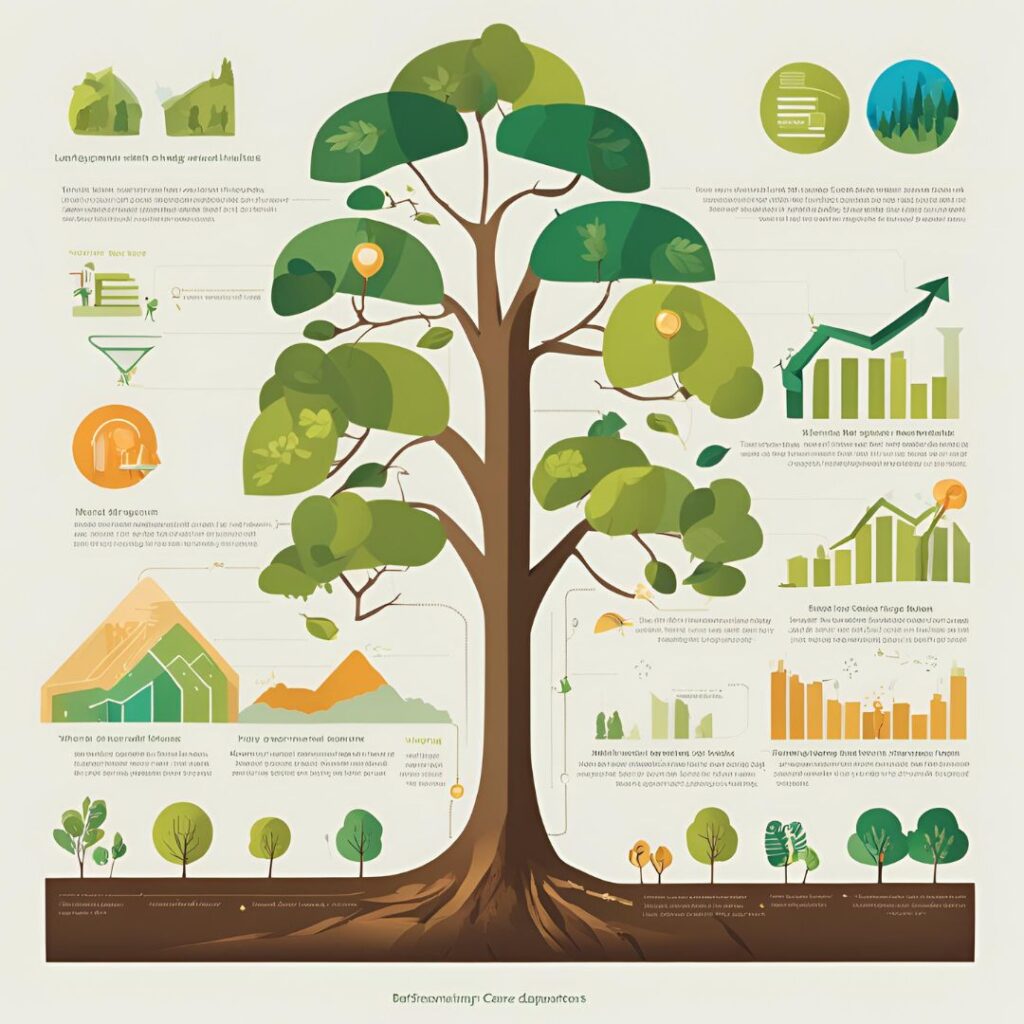Game-Changing Strategies 2025
Investing is a crucial aspect of building and securing financial wealth. As we step into 2025, the investment landscape continues to evolve with new trends, technologies, and economic conditions shaping opportunities. In this comprehensive blog post, we will delve into seven game-changing investment strategies for 2025. These strategies are designed to help investors maximize returns, minimize risks, and stay ahead in the ever-changing market environment.
Table of Contents
1. Embracing Sustainable Investing
Understanding Sustainable Investing
Sustainable investing, also known as ESG (Environmental, Social, and Governance) investing, focuses on companies that prioritize sustainability, ethical practices, and positive societal impact. As global awareness of environmental issues and social responsibilities grows, sustainable investing has become more than just a trend—it’s a fundamental shift in how investors approach their portfolios.

Why Sustainable Investing is Game-Changing
- Long-Term Growth: Companies committed to sustainable practices often have better long-term prospects, as they are prepared to adapt to regulatory changes and shifting consumer preferences.
- Risk Mitigation: By avoiding companies with poor ESG practices, investors can reduce exposure to potential scandals, fines, and reputational damage.
- Market Demand: Increasing demand for ESG investments is driving the creation of more financial products focused on sustainability, providing investors with a broader range of options.
Implementing Sustainable Investing
- Research ESG Ratings: Utilize resources like MSCI ESG Ratings or Sustainalytics to evaluate companies’ ESG performance.
- ESG Funds and ETFs: Consider investing in ESG-focused mutual funds or exchange-traded funds (ETFs) that align with your values and financial goals.
- Direct Stock Investment: Invest in individual companies known for their strong ESG practices, such as renewable energy firms, tech companies with robust data privacy measures, and corporations with diverse and inclusive workforces.
Case Study: Tesla’s Impact on Sustainable Investing
Tesla, a leader in electric vehicles and renewable energy, has become a prime example of how sustainable practices can lead to substantial financial returns. Despite controversies, Tesla’s commitment to innovation and sustainability has attracted a massive investor following, driving its stock price and influencing the broader market.
2. Diversification in Alternative Assets
Exploring Alternative Assets
Alternative assets include a broad range of investments outside traditional stocks, bonds, and cash. These can encompass real estate, commodities, private equity, hedge funds, and more. In recent years, alternative assets have gained popularity due to their potential for high returns and low correlation with traditional markets.

Why Alternative Assets are Game-Changing
- Portfolio Diversification: Investing in alternative assets can help reduce overall portfolio risk by diversifying beyond traditional asset classes.
- Inflation Hedge: Assets like real estate and commodities often act as hedges against inflation, preserving purchasing power over time.
- Unique Opportunities: Alternative investments can provide access to unique opportunities that aren’t available in public markets.
Implementing Diversification in Alternative Assets
- Real Estate Investment: Consider investing in residential or commercial properties, real estate investment trusts (REITs), or real estate crowdfunding platforms.
- Commodities: Explore investments in commodities like gold, silver, oil, or agricultural products through commodity ETFs or futures contracts.
- Private Equity and Venture Capital: For accredited investors, private equity and venture capital funds offer opportunities to invest in early-stage companies and private businesses.
Case Study: The Rise of Real Estate Crowdfunding
Platforms like Fundrise and RealtyMogul have democratized real estate investing by allowing individuals to invest in property projects with relatively small amounts of capital. This has opened up real estate as an asset class to a broader range of investors, contributing to the growth and accessibility of alternative investments.
3. Leveraging Technology in Investing
The Role of Technology in Modern Investing
Technological advancements are revolutionizing the investment landscape. From robo-advisors and algorithmic trading to blockchain and artificial intelligence, technology is providing new tools and strategies to enhance investment decision-making and efficiency.

Why Technology-Driven Investing is Game-Changing
- Data-Driven Insights: Advanced analytics and AI can process vast amounts of data to identify investment opportunities and trends that may be missed by human analysts.
- Automation and Efficiency: Robo-advisors and automated trading platforms can streamline portfolio management, reducing costs and improving accessibility.
- Transparency and Security: Blockchain technology offers enhanced transparency and security in transactions, potentially transforming areas like securities trading and asset tracking.
Implementing Technology-Driven Investing
- Robo-Advisors: Use robo-advisors like Betterment or Wealthfront for automated portfolio management based on your risk tolerance and financial goals.
- Algorithmic Trading: Explore algorithmic trading platforms that use pre-defined criteria to execute trades at optimal times.
- Blockchain Investments: Consider investing in blockchain-based assets like cryptocurrencies or blockchain technology companies.
Case Study: The Impact of Robo-Advisors
Robo-advisors have grown significantly in popularity due to their low fees, accessibility, and ability to provide personalized investment advice. Platforms like Betterment and Wealthfront have made it easier for individuals to start investing with minimal capital and professional guidance, democratizing financial planning.
4. Focus on Emerging Markets
Understanding Emerging Markets
Emerging markets refer to countries with developing economies that are transitioning towards more industrialized and market-oriented systems. These markets often exhibit high growth potential but come with increased risks compared to developed markets.

Why Emerging Markets are Game-Changing
- High Growth Potential: Emerging markets often have higher economic growth rates compared to developed countries, driven by factors like population growth, urbanization, and industrialization.
- Diversification Benefits: Investing in emerging markets can diversify your portfolio geographically and provide exposure to different economic cycles.
- Undervalued Opportunities: Emerging markets may offer undervalued investment opportunities due to lower valuations and less market saturation.
Implementing Investments in Emerging Markets
- Emerging Market ETFs: Invest in ETFs that track emerging market indices, providing broad exposure to multiple countries and sectors.
- Direct Stock Investment: Consider investing in individual companies within emerging markets that have strong growth prospects and competitive advantages.
- Mutual Funds: Explore mutual funds focused on emerging markets, managed by professional fund managers with expertise in these regions.
Case Study: India’s Economic Growth
India’s rapid economic growth, driven by a young population, technological advancements, and government reforms, has made it an attractive destination for investors. Companies like Reliance Industries and Infosys have become key players in the global market, highlighting the potential of investing in emerging markets.
5. Adopting a Long-Term Investment Horizon
The Importance of Long-Term Investing
Long-term investing involves holding investments for an extended period, typically years or decades, to benefit from compounding returns and ride out market volatility. This strategy contrasts with short-term trading, which focuses on quick gains and frequent transactions.
Why Long-Term Investing is Game-Changing
- Compounding Returns: Over time, reinvested earnings and dividends can significantly boost overall returns, leveraging the power of compounding.
- Reduced Transaction Costs: Fewer trades mean lower transaction costs and less impact from short-term market fluctuations.
- Emotional Discipline: A long-term perspective helps investors avoid emotional decision-making and maintain focus on their financial goals.

Implementing Long-Term Investing
- Index Funds and ETFs: Invest in low-cost index funds or ETFs that track broad market indices like the S&P 500, providing diversified exposure to the overall market.
- Dividend Growth Stocks: Focus on stocks of companies with a history of consistent dividend growth, providing steady income and potential for capital appreciation.
- Retirement Accounts: Utilize tax-advantaged retirement accounts like IRAs or 401(k)s to invest for the long term while benefiting from tax deferral.
Case Study: Warren Buffett’s Investment Philosophy
Warren Buffett, one of the most successful investors of all time, is known for his long-term investment approach. His strategy of buying and holding high-quality companies for decades has resulted in substantial wealth accumulation, demonstrating the power of a long-term investment horizon.
6. Investing in Innovation and Technology
The Role of Innovation in Investing
Innovation and technology are driving forces behind economic growth and investment opportunities. Investing in cutting-edge technologies and innovative companies can provide significant returns as these industries disrupt traditional markets and create new ones.
Why Investing in Innovation is Game-Changing
- High Growth Potential: Innovative companies often experience rapid growth as they introduce new products, services, and business models.
- Market Leadership: Early investment in technology leaders can lead to substantial gains as these companies establish dominant market positions.
- Diversification: Technology and innovation investments can diversify your portfolio by providing exposure to emerging sectors and trends.

Implementing Investments in Innovation and Technology
- Tech-Focused ETFs: Invest in ETFs that focus on technology sectors, such as the Nasdaq-100 or specific themes like artificial intelligence and cybersecurity.
- Individual Tech Stocks: Consider investing in leading technology companies like Apple, Amazon, Google, and emerging players in innovative fields.
- Venture Capital and Startups: For accredited investors, venture capital funds and direct investments in startups offer opportunities to invest in early-stage companies with high growth potential.
Case Study: The Impact of FAANG Stocks
The FAANG stocks—Facebook, Apple, Amazon, Netflix, and Google—have become synonymous with technology-driven growth. These companies have consistently delivered strong performance, driven by innovation and market leadership, making them cornerstone investments in many portfolios.
7. Utilizing Tax-Efficient Investment Strategies
Understanding Tax-Efficient Investing
Tax-efficient investing focuses on maximizing after-tax returns by minimizing the impact of taxes on investment income and gains. This involves selecting investments and account types that offer favorable tax treatment and employing strategies to reduce tax liability.

Why Tax
-Efficient Investing is Game-Changing
- Increased Returns: By reducing the amount paid in taxes, investors can enhance their overall returns and retain more of their investment gains.
- Capital Preservation: Efficient tax planning helps preserve capital, allowing more money to be reinvested and compounded over time.
- Strategic Flexibility: Tax-efficient strategies provide flexibility in managing investments and withdrawals, particularly important for retirement planning.
Implementing Tax-Efficient Investment Strategies
- Tax-Advantaged Accounts: Utilize accounts like Roth IRAs, traditional IRAs, and 401(k)s to benefit from tax deferral or tax-free growth.
- Tax-Loss Harvesting: Offset capital gains with capital losses to reduce taxable income, a strategy commonly used in taxable brokerage accounts.
- Municipal Bonds: Invest in municipal bonds, which offer tax-exempt interest income at the federal level and potentially state level, depending on the issuer’s location.
Case Study: The Benefits of Roth IRAs
Roth IRAs offer tax-free growth and tax-free withdrawals in retirement, making them a powerful tool for long-term, tax-efficient investing. By contributing to a Roth IRA, investors can lock in tax-free income for the future, providing greater financial security and flexibility.
Certainly! Here are some important questions and answers about investment strategies for 2025:
1. How can investors stay ahead of inflation in 2025?
Answer:
Investors can stay ahead of inflation in 2025 by diversifying their portfolios to include assets that historically outpace inflation, such as stocks, real estate, and commodities like gold. Additionally, considering inflation-protected securities, such as Treasury Inflation-Protected Securities (TIPS), can help preserve purchasing power. Staying informed about economic trends and adjusting investment strategies accordingly is crucial.
2. What are the top emerging markets to watch in 2025?
Answer:
In 2025, top emerging markets to watch include India, Indonesia, and Brazil due to their strong economic growth, expanding middle class, and technological advancements. These countries are showing significant potential in sectors such as technology, renewable energy, and consumer goods. Investors should consider diversifying their portfolios to include exposure to these dynamic markets.
3. How is technology expected to impact investment strategies in 2025?
Answer:
Technology is expected to greatly impact investment strategies in 2025 by enhancing data analysis through artificial intelligence and machine learning, providing deeper insights into market trends and opportunities. Blockchain technology is likely to increase transparency and security in transactions. Additionally, the rise of fintech platforms will make investing more accessible and efficient for individuals.
4. What role will sustainable investing play in 2025?
Answer:
Sustainable investing will play a significant role in 2025 as investors increasingly prioritize environmental, social, and governance (ESG) factors. Companies with strong ESG practices are likely to outperform their peers due to better risk management and alignment with regulatory and consumer expectations. Sustainable investing will become a mainstream approach, with more financial products tailored to ESG criteria.
Conclusion
As we navigate the dynamic investment landscape of 2024, these seven game-changing strategies provide a comprehensive framework for building a resilient and growth-oriented portfolio. By embracing sustainable investing, diversifying into alternative assets, leveraging technology, focusing on emerging markets, adopting a long-term investment horizon, investing in innovation, and utilizing tax-efficient strategies, investors can position themselves for success in an ever-evolving market. Stay informed, stay adaptable, and most importantly, stay invested in your financial future.




